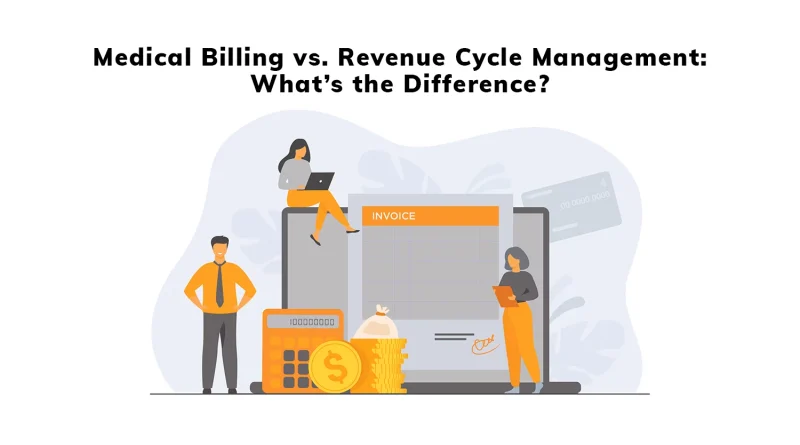Revenue cycle management vs medical billing: What’s the difference?
Healthcare providers face significant challenges in managing the financial aspects of their practice. With complex regulations and a constantly evolving insurance landscape, navigating the billing process and ensuring revenue is maximized can take time. Two terms often used in this context are billing services and revenue cycle management (RCM). While these terms are related, they are not interchangeable. This blog will explore the difference between medical billing and RCM.
What are Medical Billing Services?
Billing services are the processes involved in submitting and following up on claims with insurance companies to receive payment for medical services provided. This includes verifying insurance eligibility, submitting claims, tracking and following up on claim denials, and processing payments. Billing services may be provided by a third-party billing company or by an in-house billing department.
Medical billing services are a crucial part of the RCM process. They ensure that claims are submitted accurately and promptly, which helps to minimize claim denials and reduce the time it takes to receive payment for services provided. For healthcare providers looking to enhance their financial operations, partnering with specialized medical billing services in Massachusetts can be particularly beneficial.
What is Revenue Cycle Management (RCM)?
Revenue cycle management (RCM) is a broader term encompassing the entire process of managing the financial aspects of a healthcare organization. RCM begins with patient registration and ends with payment collection. It includes charge capture, coding, collections, and financial reporting.
The goal of RCM is to optimize the financial performance of a healthcare organization by improving revenue and reducing costs. RCM strategies may involve streamlining workflows, improving billing accuracy, reducing claim denials, and improving patient collections.
What are the key differences between RCM and Medical Billing?
The following are the major differences:
RCM:
- Focuses on the entire revenue process of a healthcare organization, from patient scheduling to final payment collection
- Involves a combination of administrative, financial, and clinical functions to optimize revenue and manage costs
- Includes tasks such as patient registration, insurance verification, coding and billing, claims processing, denial management, and payment collection
- Aims to increase revenue and reduce costs through process improvements and data analysis
- May involve the use of technology solutions such as electronic health records (EHRs), revenue cycle management software, and business intelligence tools
- Involves a proactive approach to managing the revenue process of a healthcare organization, including all steps from the moment a patient makes an appointment to the time the healthcare provider receives payment for services rendered
- Addresses not only the billing process but also the clinical and administrative processes that contribute to performance, such as patient access, charge capture, clinical documentation, and coding accuracy
Medical Billing:
- Focuses specifically on the process of submitting and following up on claims to insurance payers for reimbursement of healthcare services rendered
- Involves tasks such as verifying patient eligibility, submitting claims, tracking claim status, and appealing denied claims
- Aims to ensure that healthcare providers receive timely and accurate payment for their services
- This may involve the use of billing software and knowledge of billing codes and regulations
- Refers to the specific process of submitting and following up on claims to insurance payers for reimbursement of healthcare services rendered
- This may involve partnering with a billing service provider to manage billing functions or using billing software to streamline the billing process
- Conduct regular medical billing audits to ensure accuracy and transparency in all processes
While billing is a component of RCM, RCM encompasses a broader range of functions and aims to optimize revenue and reduce costs across the entire revenue management.
Conclusion
Billing services and revenue cycle management are essential concepts in the healthcare industry. Billing services focus on submitting and managing claims with insurance companies, while revenue management encompasses a broader range of financial management tasks.
Healthcare organizations can develop strategies to optimize their revenue and reduce costs by understanding the differences between these two terms. Whether managing their RCM in-house or outsourcing to a third-party provider, healthcare providers should ensure they have a comprehensive strategy to manage their financial operations effectively.
FAQs
Q: What are the benefits of effective RCM?
A: Effective revenue cycle management can help healthcare providers maximize revenue, minimize denials and unpaid claims, improve patient satisfaction, and manage their finances more effectively.
Q: What are the critical components of RCM?
A: The key components of revenue cycle management include verifying patient insurance coverage and eligibility, collecting patient co-pays and deductibles, submitting claims to insurance companies, managing denials and appeals, and following up on payments.
Q: How can healthcare providers improve their RCM?
A: Healthcare providers can improve their RCM by implementing technology solutions such as electronic health records (EHRs) and practice management software, outsourcing billing or revenue process management, and implementing best practices for denials and appeals.
Q: What are the critical steps in the billing process?
A: The critical steps in the billing process include verifying patient insurance coverage and eligibility, coding medical services and diagnoses, submitting claims to insurance companies, and following up on unpaid claims and denials.

